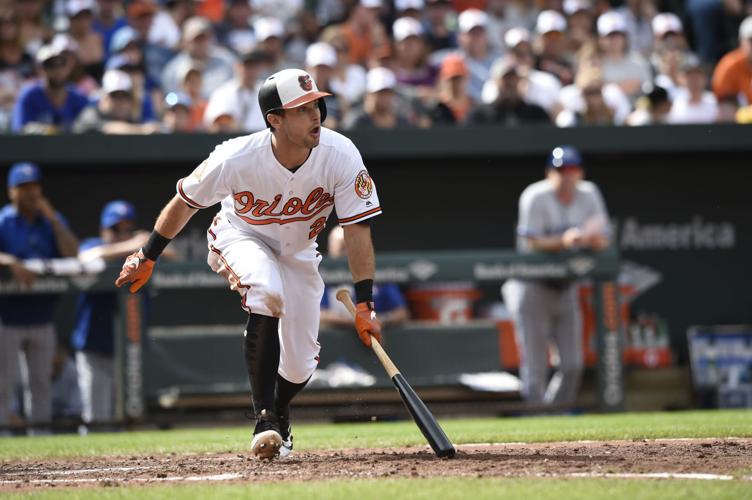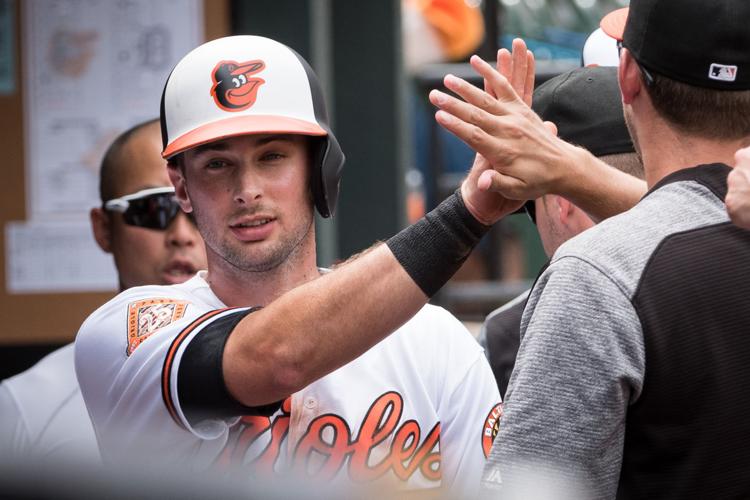MLB’s regular season concludes Sunday, meaning roughly 800 players — 25 per team on the 20 teams that won’t make the playoffs — will begin to evaluate their futures.
Some — say, a Mike Trout — feel pretty good about their chances.
Many others will wonder what 2018 season might hold.
You think it’s hard to make it to the major leagues?
The raw talent that shows itself around age 8 and the attitude that follows. Pee Wee success turning into travel ball commitments. High school bus rides in the spring, summer ball in the sweltering desert heat. A successful college career, including a trip to the mountaintop, and draft selection and years in the minors.
All to break in to the bigs, like Joey Rickard, the Arizona Wildcat-turned-Baltimore Orioles outfielder.
People are also reading…
Now at the end of his second major league season, a rocky year for the sub-.500 Orioles, Rickard is about to enter a perilous offseason.
You think it’s hard to make it? Imagine how hard it is to stay there.
• • •
It’s not as if Rickard’s path to the Orioles gives him a heightened feeling of security. That went away last season.
A star at both Bishop Gorman High School in Las Vegas and at the UA, where he won a 2012 College World Series title and was named to the all-tournament team, Rickard was a ninth-round pick to the Tampa Bay Rays in 2012. He impressed and improved in the minors, moving through Double-A and Triple-A ball by 2015, when he’d become one of the budding prospects in the crowded Rays minor league system.
Left unprotected in the 2015 Rule 5 Draft, which was devised to prevent teams from loading up on minor-league players, Rickard was selected by the Orioles. He would have to remain on Baltimore’s 25-man major league roster for all of the following season or be sent back to Tampa.
This has worked out splendidly for some teams in the past. Jose Bautista and Johan Santana, Bobby Bonilla and Shane Victorino were all Rule 5 selections. Roberto Clemente ring a bell? How about George Bell? Yup, Rule 5s.
Rickard didn’t just stick with the Orioles last year, he shined. He hit .280 in his first month in the majors with an OPS (on-base percentage plus slugging percentage) above .700. Rickard was opening some eyes when he injured his thumb in mid-July. He finished the season with a .268 batting average while filling in at all three outfield spots. His defense was a persistent question mark, however.
A year later, it might be his saving grace.
Rickard is batting .244 with four home runs and 19 RBIs in 258 at-bats this season.
He’s excelled in the field, registering a sterling 24.8 UZR/150 rating, which ranks second behind Curtis Granderson among MLB right-fielders who have played more than 200 innings this season. Ultimate zone rating, which is figured by Fangraphs.com baseball analyst Mitchel Lichtman, compares defensive players based on how they would fare against the average player covering their zone on the field.
“It’s something I’ve worked on every day,” Rickard said in the visitor’s clubhouse of Yankee Stadium on a mid-September morning.
“The hitting — sometimes you’re not going to feel your greatest every day — and the one thing that should be consistent is your defense. It’s a daily thing with the guys here and hopefully its paying off.”
Not just paying off, but securing more paychecks in the future.
His defensive coach with the Orioles, Wayne Kirby, sees Rickard’s defense as the key to his future.
Kirby said the team tweaked Rickard’s throw a bit this season to make sure he wasn’t “double-tapping in the glove.” Kirby, a platoon-player for eight years with the Cleveland Indians, Los Angeles Dodgers and New York Mets, sees a future for Rickard.
“His defense will keep him in the big leagues for a long time; it’s a lost art,” Kirby said. “But learning more how to bunt, learning how to create havoc — with his wheels, he could creep out seven, eight bunts a year just from bunting — and if you can hit a few, bunt well, play good defense, everybody needs ya.”
• • •
That grind baseball players always talk about — and over 162 games, almost one game for every two days of the calendar year, it is most certainly a grind — well, Rickard has figured that out a bit in Year 2.
“Just having been through all of this once before, the ballparks, the hotels, how late you get in, how you adjust, it’s about knowing what’s expected,” he said. “The experience allows you to slow everything down. In time you learn to trust your instincts a little more. It comes with repetitions, and year-by-year, you should get more comfortable.”
But for Rickard, not too comfortable.
Platooning in the outfield can wreak havoc on a player’s timing at the plate, and Rickard admits he has struggled offensively this year.
People forget: He’s getting almost the same number of swings every day, minus the few more he’d have if he plays in a game that day. But still, nothing can replace live game action.
“One of the things I learned from vets years ago (is) once you become a platoon player, you’ve got to shorten your swing a little bit,” Kirby said. “Eddie Murray told me one time, ‘Kirb, you haven’t played in three days. Give the first at-bat to them. See his movement, see his velocity, see what you can. After that, let’s go to work.’ Someone taught me how to succeed in that job.”
Now, Kirby teaches Rickard.
“Having another year with Wayne Kirby allowed me to relax,” Rickard said. “And playing besides (All-Star center fielder) Adam Jones doesn’t hurt either. He’s made it a little easier on me, as well.”
At least in the field, because at the plate, it’s a one-man job.
A full-time job, at that.
“It’s definitely a challenge,” Rickard said. “You just have to know yourself. Do you need to take 100 swings today? Ten? I go about it every day, and by the time the game has started, I’ve gone through a days work of it.”
Rickard is doing his job to keep his job.
“There’s a lot of work that goes into this game, and you only see the three or four hours we’re out there,” he said. “Everything that we do behind the scenes helps us play at our best. You have to attack every day like you’re playing.”
On this day, he’ll enter the game in the seventh inning and rip an RBI double. Unseen is the work he put in hour earlier.
At around 6 p.m., Rickard got in his batting practice. His first ball is a rope to the outfield, his second and third up the middle. He rotates out with a pep in his step.
He’ll stand next to Orioles manager Buck Showalter for a spell, and Showalter will later say, “We’re talking baseball, defense, situations all the time,” about his team.
Kirby will have some words for him later, as well.
“You never stop learning in this game,” he said. “Once you figure you’ve got it all, it bites you. Baseball is Groundhog Day. Come out here, get your work done, and give it 100.”









